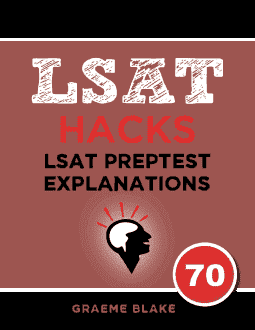QUESTION TEXT: Recent medical and anthropological data show that…
QUESTION TYPE: Necessary Assumption
CONCLUSION: The data can't explain the origin of the prohibitions.
REASONING: Data show that certain food prohibitions were useful. But ancient peoples who made the prohibitions didn't have access to that data.
ANALYSIS: This is a tricky flaw. I'll illustrate with an example. Let's say you're with a group of people, and you come across two doors, A and B.
Some people from your group go through each door, and return. They can't remember what happened. But the people who went through door A came back with good food, fine clothing and bountiful treasure. The people who went through door B came back moaning in pain, and died shortly thereafter.
You don't know what happened beyond the doors, but wouldn't you choose to go through door A instead of door B?
Now suppose that scientists later studied the doors. They found that through door A there was a generous wizard, and that through door B there was an evil sorcerer. Obviously, the group's decision to go through door A can be explained in terms of this data, even though at the time the group only had access to the effects of the wizards, and not the full data.
In other words, you can repeat a good decision without knowing why it works. The original peoples might have seen that a food was causing harm. They wouldn't know why – only future data could explain the harm. But the people nonetheless banned the harmful food, and thus the later data can explain the decision.
I've made this explanation longer because I wanted to give you a full explanation of the situation. It's one of the most subtle that I've seen.
___________
- CORRECT. The negation of this answer says that we don't need to worry about what the people originally knew. It completely wrecks the argument – maybe we can explain the prohibitions in terms of our data, even if the original people didn't have access to the data.
Negation: The origins of a food prohibition don't need to be explained with reference to the understanding that the people who adopted the prohibition had. - The stimulus didn't say whether any of the food prohibitions were contradictory. This is totally irrelevant.
- Negate this and you get: there's a correlation between the social usefulness of a food prohibition and the nutritional value of that food.
That has no impact on the argument. The argument didn't talk about how nutritional food was. - “Often” is a synonym for most. So the negation of this answer is “half or less of the time, the origins of a food prohibition are forgotten within a few generations”. The change from “most” to “half” has no effect on the argument. “Most” statements tend to be useless for necessary assumption questions.
This isn't relevant in any case. The argument is about what the original reasons were, not how long they were remembered. - The negation is “the originators of the prohibitions generally didn't have a non-technical understanding of the medical impacts of the prohibitions “.
This negated version helps the argument, by showing that the medical function can't help explain the origins.


Wow this argument made no sense to me until I read your explanation. Thank you!
What’s your justification for “often” being a synonym of “most”?
On the LSAT, “often” is sometimes used as a synonym of “most” in the sense that it refers to more than 50% of cases. It’s one of a few words used on the LSAT where the sense in which the word is used on the test differs from the precise dictionary definition.